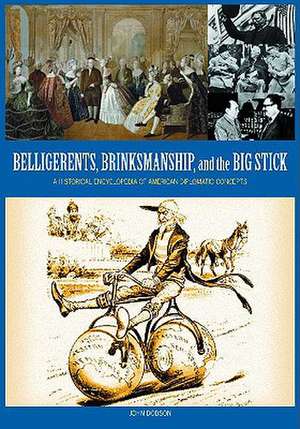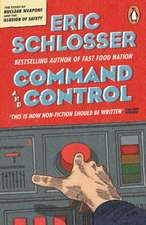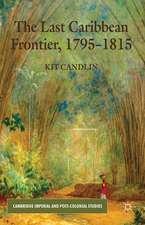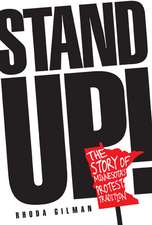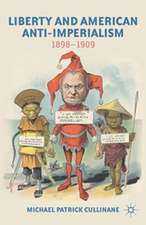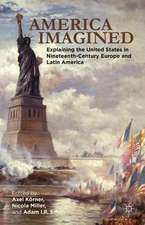Belligerents, Brinkmanship, and the Big Stick: A Historical Encyclopedia of American Diplomatic Concepts
Autor John M. Dobsonen Limba Engleză Hardback – 13 iul 2009 – vârsta până la 17 ani
Preț: 374.41 lei
Preț vechi: 643.21 lei
-42% Nou
Puncte Express: 562
Preț estimativ în valută:
71.65€ • 77.80$ • 60.19£
71.65€ • 77.80$ • 60.19£
Carte tipărită la comandă
Livrare economică 22 aprilie-06 mai
Livrare express 18-22 martie pentru 219.51 lei
Preluare comenzi: 021 569.72.76
Specificații
ISBN-13: 9781598841312
ISBN-10: 1598841319
Pagini: 416
Dimensiuni: 178 x 254 x 30 mm
Greutate: 1 kg
Editura: Bloomsbury Publishing
Colecția ABC-CLIO
Locul publicării:New York, United States
ISBN-10: 1598841319
Pagini: 416
Dimensiuni: 178 x 254 x 30 mm
Greutate: 1 kg
Editura: Bloomsbury Publishing
Colecția ABC-CLIO
Locul publicării:New York, United States
Caracteristici
Over 200 chronological and alphabetic listings of major concepts and events in the history of American foreign relations as well as brief biographical entries on individuals who made major diplomatic contributions
Notă biografică
John Dobson, PhD, is professor emeritus of history at Oklahoma State University, Stillwater, OK, where he also served as dean of the College of Arts and Science. His published works include ABC-CLIO's Bulls, Bears, Boom, and Bust: A Historical Encyclopedia of American Business Concepts.
Cuprins
Preface,Acknowledgments,Section 1: Inventing a Foreign Policy, 1776-1830,Key Concepts,Alliance,Diplomats,Embargo,Impressment,Jay's Treaty,Legitimacy,Louisiana,Mercantilism,Monroe Doctrine,Most Favored Nation,Neutrality,Nonimportation,No-Transfer Principle,Paper Blockade,Pinckney's Treaty,Plan of 1776,Plenipotentiary,Quasi-War with France,Ratification,Recognition,Rule of 1756,Transcontinental Treaty (Florida),Treaty (Treaty of Paris, 1783),Uti Possedetus (Treaty of Ghent, 1814),War Hawks,XYZ Affair,Biographies,Deane, Silas,Franklin, Benjamin,Gallatin, Albert,Genêt, Edmond,Jay, John,Livingston, Robert,Logan, George,Rush, Richard,Symmes, John Cleve,Wilkinson, James,Section 2: Expansion and Civil War, 1830-1880,Key Concepts,Alaska,Arbitration (Alabama Claims),China Market,Filibustering,First Shot Tradition,Japan, Opening of,Joint Resolution (Texas),King Cotton Diplomacy,Manifest Destiny,Mexican War,Natural Boundaries,Oregon Claims,Oregon Fever,Ostend Manifesto (Cuba),Recognition as a Belligerent,Santo Domingo,Texas Revolution,Webster-Ashburton Treaty,Biographies,Adams, Charles Francis,Astor, John Jacob,Bidlack, Benjamin A.,Burlingame, Anson,Calhoun, John Caldwell,Clayton, John Middleton,Cushing, Caleb,Gadsden, James,Harris, Townsend,Kearny, Stephen Watts,Perry, Matthew Calbraith,Scott, Winfield,Seward, William H.,Slidell, JohnStockton, Robert FieldTrist, NicholasUpshur,Abel,Van Buren, Martin,Walker, William,Webster, Daniel,Wilkes, Charle,Section 3: Rise of a Great Power, 1880-1914,Key Concepts,Algeciras,Anti-Imperialism,Big Stick,Boxer Rebellion,Cuban Rebellion,Dollar Diplomacy,Gunboat Diplomacy,Hawaii,Jingoism,Mediation (Russo-Japanese War),Mission,Neutralization,New Manifest Destiny,Olney Corollary,Open Door Policy,Panama,Pan-Americanism,Platt Amendment,Protectionism,Punitive Expedition,Rapprochement,Spanish-American-Cuban War,Sugar,Biographies,Adee, Alvey,Blaine, James Gillespie,Bryan, William Jennings,Dewey, George,Hay, John Milton,Olney, Richard,Root, Elihu,Shufeldt, Robert Wilson,Stevens, John Leavitt,Teller, Henry Moore,Wood, Leonard,Section 4: The World Wars, 1914-1945,Key Concepts,American Expeditionary Force,Atlantic Charter,Atomic Diplomacy,Disarmament,Four Policemen,Fourteen Points,Good Neighbor Policy,Grand Alliance,Great War,Island Hopping,Isolationism,Kellogg-Briand Pact,League of Nations,Lend-Lease,Neutrality (1914-1917),Neutrality Acts,Non-recognition,Pearl Harbor,Quarantine,Red Scare,Second Front,Siberian Expedition,Stimson Doctrine,United Nations,Unrestricted Submarine Warfare,Yalta,Biographies,Hopkins, Harry,Hughes, Charles Evans,Hull, Cordell,Kellogg, Frank B.,Lodge, Henry Cabot,Nye, Gerald P.,Pershing, John J.,Stimson, Henry L.,Section 5: The Cold War and After, 1945-,Key Concepts,Bay of Pigs,Berlin,Brinkmanship,Bush Doctrine,Cambodia,Containment,Détente,Free TradeGATT,Gulf War,Hostage CrisisIran-Contra,IsraelLand for Peace,Liberation of Eastern Europe,Limited War (Korea),Marshall Plan,Massive Retaliation,North Atlantic Treaty Organization (NATO),NSC-68,Red Scare Again,Shuttle Diplomacy,Sputnik,Tet,Tonkin Gulf Incident,Truman Doctrine,U-2,War on Terror,Biographies,Acheson, Dean,Dulles, John Foster,Kissinger, Henry,Marshall, George C.,McNamara, Robert Strange,Rumsfeld, Donald,Chronology,Index,About the Author,
Recenzii
This book should be in all libraries that have a historical focus and particularly those that focus on governments and foreign policy.
This dictionary is suitable for all levels and libraries.
College-level libraries strong in political science history will find this a key acquisition, packing in excerpts from key foreign policy documents, treaties, statements and more.
The volume will interest a variety of readers: from students and educators to politics and history enthusiasts.
Dobson's comprehensive work uses a chronological structure, covering the years since 1776 in five parts. Each of these sections begins with an overview of American diplomacy during that era. Bolded key concepts refer readers to the more in-depth alphabetically arranged entries that follow, each of which includes meticulous citing of footnotes and sources. Biographies of important period diplomats conclude each section. Primary sources are emphasized throughout, with excerpts from, or the full text of, speeches and important documents, such as a letter from William Seward to Abraham Lincoln on the eve of the Civil War, Woodrow Wilson's Fourteen Points, and the Tonkin Gulf Resolution, appearing in text boxes. Back matter includes a detailed chronology with entry titles bolded for easy access. Black-and-white photos and illustrations offer additional material. Elegant organization makes Belligerents an ideal reference work; Dobson's clear explanations of big-picture concepts and how they relate to specific situations in American history make this a readable and useful resource.
Using a chronological framework, the author has produced a reference source that enables a user to comprehend how U.S. foreign policy changed over time. . . . The author's experiences at home and abroad have given him a broader perspective than many, and his teaching skills enable him to write for an audience that knows some things but would like to learn more about why Americans think and behave as they do regarding other cultures. Some aspects of U.S. foreign policy are rooted in values; others are based on pragmatism. This book helps serious readers sort that out and is recommended for academic libraries and large public library collections. Also available as an e-book.
This reference book also could serve as a handy supplemental text for political science classes covering American foreign relations. . . . Recommended. Lower- and upper-level undergraduates; general readers.
This dictionary is suitable for all levels and libraries.
College-level libraries strong in political science history will find this a key acquisition, packing in excerpts from key foreign policy documents, treaties, statements and more.
The volume will interest a variety of readers: from students and educators to politics and history enthusiasts.
Dobson's comprehensive work uses a chronological structure, covering the years since 1776 in five parts. Each of these sections begins with an overview of American diplomacy during that era. Bolded key concepts refer readers to the more in-depth alphabetically arranged entries that follow, each of which includes meticulous citing of footnotes and sources. Biographies of important period diplomats conclude each section. Primary sources are emphasized throughout, with excerpts from, or the full text of, speeches and important documents, such as a letter from William Seward to Abraham Lincoln on the eve of the Civil War, Woodrow Wilson's Fourteen Points, and the Tonkin Gulf Resolution, appearing in text boxes. Back matter includes a detailed chronology with entry titles bolded for easy access. Black-and-white photos and illustrations offer additional material. Elegant organization makes Belligerents an ideal reference work; Dobson's clear explanations of big-picture concepts and how they relate to specific situations in American history make this a readable and useful resource.
Using a chronological framework, the author has produced a reference source that enables a user to comprehend how U.S. foreign policy changed over time. . . . The author's experiences at home and abroad have given him a broader perspective than many, and his teaching skills enable him to write for an audience that knows some things but would like to learn more about why Americans think and behave as they do regarding other cultures. Some aspects of U.S. foreign policy are rooted in values; others are based on pragmatism. This book helps serious readers sort that out and is recommended for academic libraries and large public library collections. Also available as an e-book.
This reference book also could serve as a handy supplemental text for political science classes covering American foreign relations. . . . Recommended. Lower- and upper-level undergraduates; general readers.
